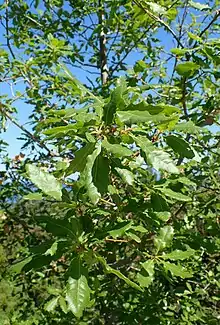بلوط
Arabic

بَلُّوط
Etymology
From Aramaic בְּלוּטָא / ܒܠܘܛܐ (bəllūṭā, ballūṭā, “oak; acorn”), further
- according to Löw an Aramaic formation from Aramaic בָלַט (bālaṭ, “to bulge out, to stand forth”), because of the nut having a protruding appearance, the pattern KaLLūM being common in Aramaic for fruits.
- possibly related to Akkadian 𒋾 (balāṭu, “to live, to stay or remain, to be enduring; to bring back to life, life-bringing trees or seeds”).
- potentially also Akkadian 𒄑𒁁𒀖 (be-lit, baluṭ, “a strong tree, bearing edible produce, sustainable in more northerly fringes of the Assyrian Empire”) found in the vicinity of Harran mentioned during the reign of Sargon II, the more typical word for oak being 𒀠𒆷𒀭 (ʾallānu, alyānu, “oak; acorn”) from Sumerian 𒄑𒀠𒆷𒈝 (allanum, “oak; acorn, acorn-shaped”). Compare Aramaic אִילָנָא, Classical Syriac ܐܺܝܠܳܢܳܐ (ʾīlānā, “tree”), Hebrew אֵלָה (ʾelā, “terebinth”), Hebrew אֵילִים (ēlīm, “mighty tree”), Hebrew אֵלֹון (elōn, “great tree”), Hebrew אַלּוֹן (allōn, “great tree; oak”).
further cognates
- comparable to Middle Persian blwt' (balūt, “acorn, oak-nut”), Mazanderani پلت (palat, “maple, poplar”), Northern Kurdish berrû, belû, dialectal Turkish bolut, pelüt, palıt, pölüt, pelit, pilit etc., Azerbaijani palıd, dialectal palut, Uzbek balut, Turkish palamut / پلاموت, pelit / پلیت, pelid / پلید, Chagatai [script needed] (pälütʼʼ), all meaning the oak and/or its nut. The borrowing directions cannot be ascertained.
- whereas Venetian palamita, Serbo-Croatian palàmīda / пала̀мӣда, Byzantine Greek παλαμύδα (palamúda) / παλαμίδα (palamída), Greek παλαμύδι (palamýdi) / παλαμίδι (palamídi), Romanian pălămidă mean the creeping thistle Serratula arvensis L. which looks at its top similar to the acorn.
- to be distinguished from the fish-names Greek παλαμύδα (palamýda), παλαμίδα (palamída) from Ancient Greek πᾱλᾰμῠ́ς (pālamús) / πηλᾰμῠ́ς (pēlamús) and its numerous descendants meaning Sarda sarda (Atlantic bonito).
Pronunciation
- IPA(key): /bal.luːtˤ/
Declension
Declension of noun بَلُّوط (ballūṭ)
| Collective | basic collective triptote | ||
|---|---|---|---|
| Indefinite | Definite | Construct | |
| Informal | بَلُّوط ballūṭ |
الْبَلُّوط al-ballūṭ |
بَلُّوط ballūṭ |
| Nominative | بَلُّوطٌ ballūṭun |
الْبَلُّوطُ al-ballūṭu |
بَلُّوطُ ballūṭu |
| Accusative | بَلُّوطًا ballūṭan |
الْبَلُّوطَ al-ballūṭa |
بَلُّوطَ ballūṭa |
| Genitive | بَلُّوطٍ ballūṭin |
الْبَلُّوطِ al-ballūṭi |
بَلُّوطِ ballūṭi |
| Singulative | singulative triptote in ـَة (-a) | ||
| Indefinite | Definite | Construct | |
| Informal | بَلُّوطَة ballūṭa |
الْبَلُّوطَة al-ballūṭa |
بَلُّوطَة ballūṭat |
| Nominative | بَلُّوطَةٌ ballūṭatun |
الْبَلُّوطَةُ al-ballūṭatu |
بَلُّوطَةُ ballūṭatu |
| Accusative | بَلُّوطَةً ballūṭatan |
الْبَلُّوطَةَ al-ballūṭata |
بَلُّوطَةَ ballūṭata |
| Genitive | بَلُّوطَةٍ ballūṭatin |
الْبَلُّوطَةِ al-ballūṭati |
بَلُّوطَةِ ballūṭati |
| Dual | Indefinite | Definite | Construct |
| Informal | بَلُّوطَتَيْن ballūṭatayn |
الْبَلُّوطَتَيْن al-ballūṭatayn |
بَلُّوطَتَيْ ballūṭatay |
| Nominative | بَلُّوطَتَانِ ballūṭatāni |
الْبَلُّوطَتَانِ al-ballūṭatāni |
بَلُّوطَتَا ballūṭatā |
| Accusative | بَلُّوطَتَيْنِ ballūṭatayni |
الْبَلُّوطَتَيْنِ al-ballūṭatayni |
بَلُّوطَتَيْ ballūṭatay |
| Genitive | بَلُّوطَتَيْنِ ballūṭatayni |
الْبَلُّوطَتَيْنِ al-ballūṭatayni |
بَلُّوطَتَيْ ballūṭatay |
| Paucal (3-10) | sound feminine paucal | ||
| Indefinite | Definite | Construct | |
| Informal | بَلُّوطَات ballūṭāt |
الْبَلُّوطَات al-ballūṭāt |
بَلُّوطَات ballūṭāt |
| Nominative | بَلُّوطَاتٌ ballūṭātun |
الْبَلُّوطَاتُ al-ballūṭātu |
بَلُّوطَاتُ ballūṭātu |
| Accusative | بَلُّوطَاتٍ ballūṭātin |
الْبَلُّوطَاتِ al-ballūṭāti |
بَلُّوطَاتِ ballūṭāti |
| Genitive | بَلُّوطَاتٍ ballūṭātin |
الْبَلُّوطَاتِ al-ballūṭāti |
بَلُّوطَاتِ ballūṭāti |
Descendants
- Gulf Arabic: بلوط (ballūṭ)
- Maltese: ballut
- → Amharic: ባሉጥ (baluṭ)
- → Middle Armenian: պալուտ (palut)
- → Azerbaijani: palıd
- → Catalan: bellota
- → Crimean Tatar: pelit
- → Ge'ez: ባሉጥ (baluṭ)
- → Spanish: bellota
- → Tigre: ባሉጥ (baluṭ)
- → Ottoman Turkish: بلوط (belût)
- → Ottoman Turkish: پلیت (pelit, “acorn; valonia”)
- → Turkish: palıt, pelit
- → Uyghur: بەللۇت (bellut)
- → Uzbek: balut
References
- “بلوط” in Almaany
- “blṭ”, in The Comprehensive Aramaic Lexicon Project, Cincinnati: Hebrew Union College, 1986–
- “blwṭ”, in The Comprehensive Aramaic Lexicon Project, Cincinnati: Hebrew Union College, 1986–
- Bläsing, Uwe (1995) Armenisch-Türkisch. Etymologische Betrachtungen ausgehend von Materialien aus dem Hemşingebiet (Dutch Studies in Armenian Language and Literature; 4) (in German), Amsterdam and Atlanta: Rodopi, →ISBN, pages 103–104
- Fraenkel, Siegmund (1886) Die aramäischen Fremdwörter im Arabischen (in German), Leiden: E. J. Brill, page 139
- Leslau, Wolf (1991) Comparative Dictionary of Geʿez (Classical Ethiopic), 2nd edition, Wiesbaden: Otto Harrassowitz, →ISBN, page 98
- Löw, Immanuel (1928) Die Flora der Juden (in German), volume 1, Wien und Leipzig: R. Löwit, pages 621–630, specificallly page 624
- Löw, Immanuel (1881) Aramæische Pflanzennamen (in German), Leipzig: Wilhelm Engelmann, pages 72–73
- Nöldeke, Theodor (1910) Neue Beiträge zur semitischen Sprachwissenschaft (in German), Straßburg: Karl J. Trübner, page 44
- Steingass, Francis Joseph (1892) “بلوط”, in A Comprehensive Persian–English dictionary, London: Routledge & K. Paul, page 199
- Wehr, Hans with Kropfitsch, Lorenz (1985) “بلوط”, in Arabisches Wörterbuch für die Schriftsprache der Gegenwart (in German), 5th edition, Wiesbaden: Otto Harrassowitz, published 2011, →ISBN, page 109
Ottoman Turkish
Persian
Etymology
From Middle Persian blwt' (balūt, “oak, acorn”), attested in Husraw ī Kawādān ud rēdag-ē, from Aramaic בְּלוּטָא / ܒܠܘܛܐ (bəllūṭā, ballūṭā, “oak; acorn”), see Arabic بَلُّوط (ballūṭ) for more.
Pronunciation
- (Classical Persian) IPA(key): [ba.luːt]
- (Dari, formal) IPA(key): [bä.luːt̪]
- (Kabuli) IPA(key): [bä.luːt̪]
- (Hazaragi) IPA(key): [bä.lut̪]
- (Iran, formal) IPA(key): [bæ.luːt̪]
- (Tajik, formal) IPA(key): [bä.lut̪]
| Readings | |
|---|---|
| Classical reading? | balūt |
| Dari reading? | balūt |
| Iranian reading? | balut |
| Tajik reading? | balut |
South Levantine Arabic
This article is issued from Wiktionary. The text is licensed under Creative Commons - Attribution - Sharealike. Additional terms may apply for the media files.